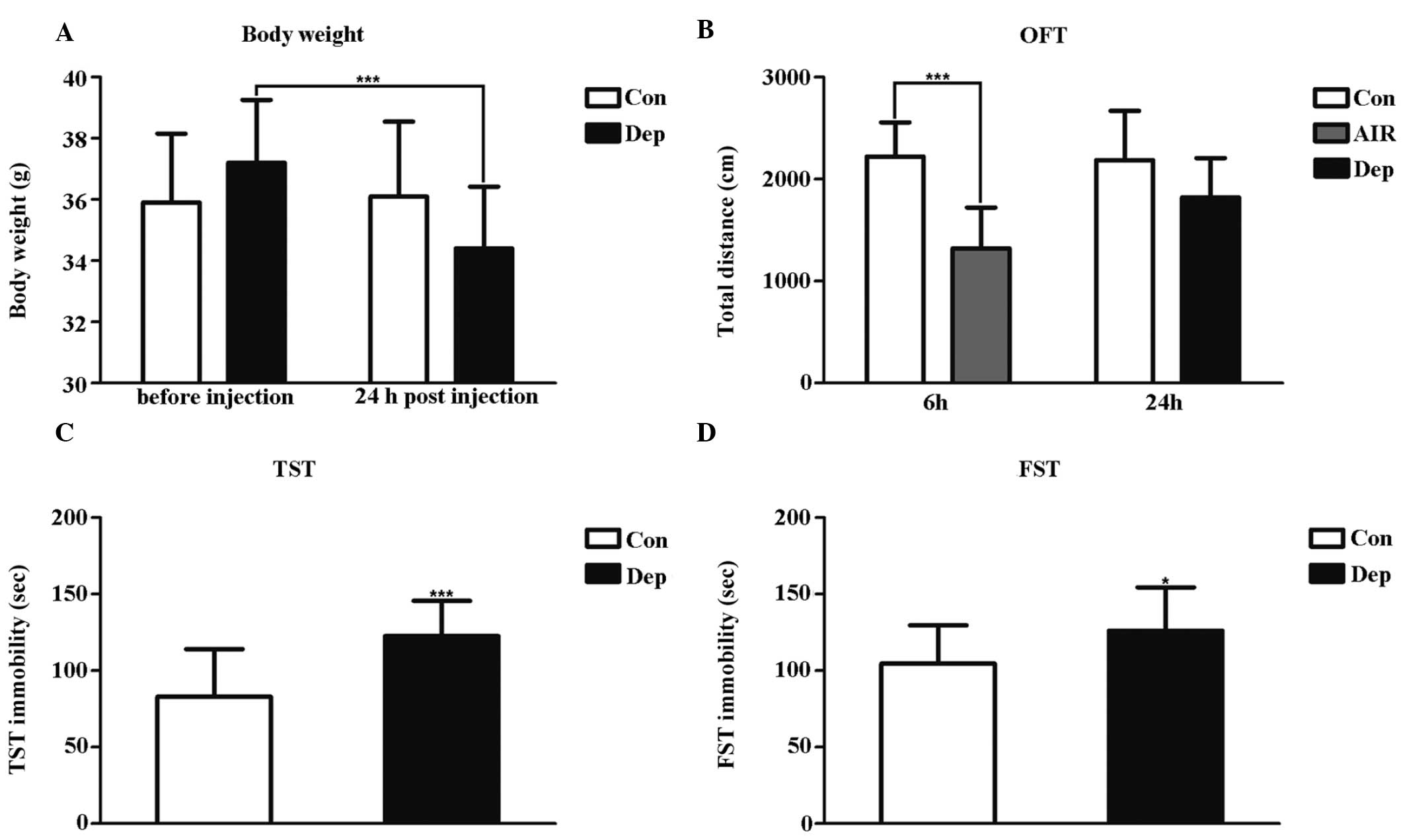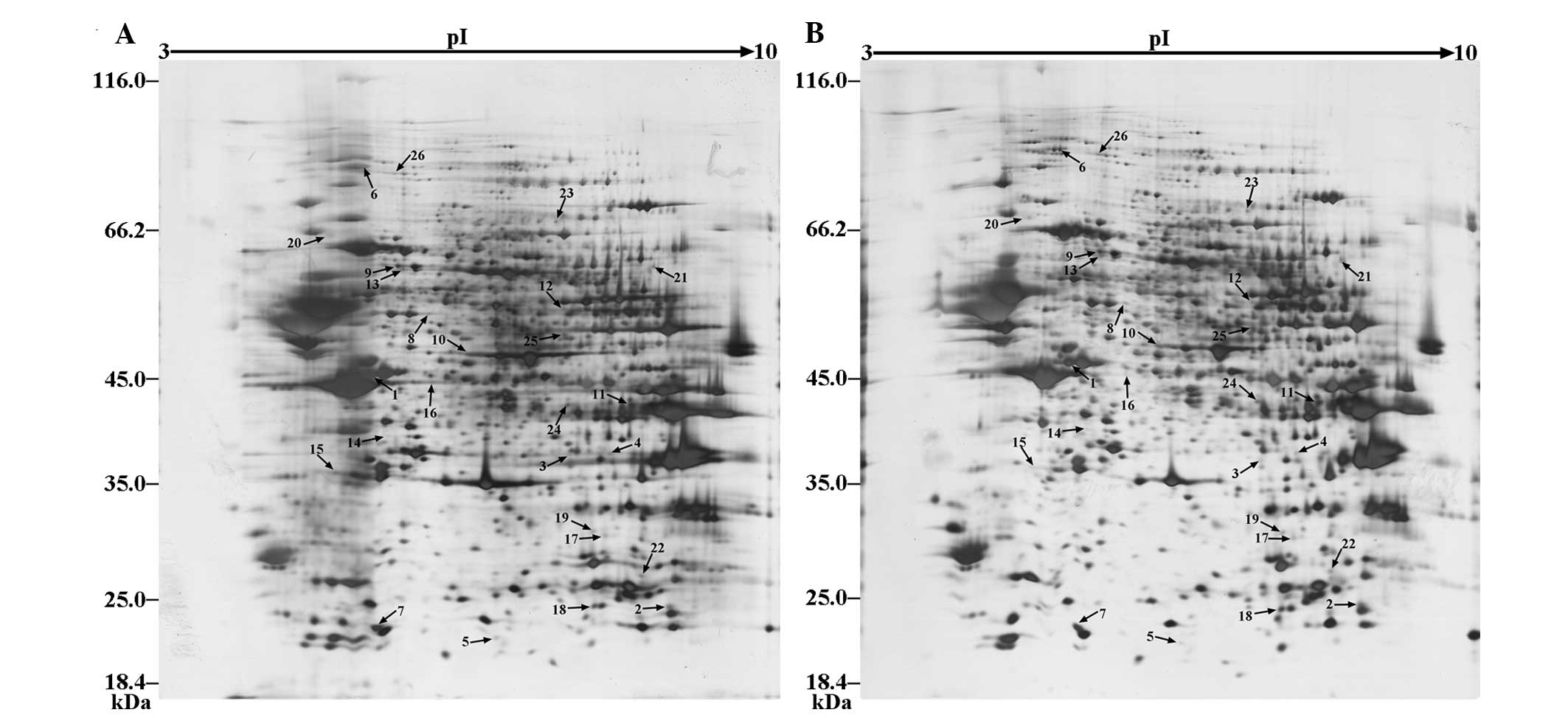|
1
|
Kessler RC, Birnbaum H, Bromet E, Hwang I,
Sampson N and Shahly V: Age differences in major depression:
Results from the National Comorbidity Survey Replication (NCS-R).
Psychol Med. 40:225–237. 2010. View Article : Google Scholar
|
|
2
|
Raison CL, Capuron L and Miller AH:
Cytokines sing the blues: Inflammation and the pathogenesis of
depression. Trends Immunol. 27:24–31. 2006. View Article : Google Scholar
|
|
3
|
Zorrilla EP, Luborsky L, McKay JR,
Rosenthal R, Houldin A, Tax A, McCorkle R, Seligman DA and Schmidt
K: The relationship of depression and stressors to immunological
assays: A meta-analytic review. Brain Behav Immun. 15:199–226.
2001. View Article : Google Scholar : PubMed/NCBI
|
|
4
|
Yirmiya R, Pollak Y, Morag M, Reichenberg
A, Barak O, Avitsur R, Shavit Y, Ovadia H, Weidenfeld J, Morag A,
et al: Illness, cytokines, and depression. Ann NY Acad Sci.
917:478–487. 2000. View Article : Google Scholar
|
|
5
|
Dantzer R, O'Connor JC, Freund GG, Johnson
RW and Kelley KW: From inflammation to sickness and depression:
When the immune system subjugates the brain. Nat Rev Neurosci.
9:46–56. 2008. View
Article : Google Scholar
|
|
6
|
Frenois F, Moreau M, O'Connor J, Lawson M,
Micon C, Lestage J, Kelley KW, Dantzer R and Castanon N:
Lipopolysaccharide induces delayed FosB/DeltaFosB immunostaining
within the mouse extended amygdala, hippocampus and hypothalamus,
that parallel the expression of depressive-like behavior.
Psychoneuroendocrinology. 32:516–531. 2007. View Article : Google Scholar : PubMed/NCBI
|
|
7
|
Hannestad J, DellaGioia N and Bloch M: The
effect of antidepressant medication treatment on serum levels of
inflammatory cytokines: A meta-analysis. Neuropsychopharmacology.
36:2452–2459. 2011. View Article : Google Scholar : PubMed/NCBI
|
|
8
|
Koenigs M and Grafman J: The functional
neuroanatomy of depression: Distinct roles for ventromedial and
dorsolateral prefrontal cortex. Behav Brain Res. 201:239–243. 2009.
View Article : Google Scholar : PubMed/NCBI
|
|
9
|
Ye T, Peng J, Nie B, Gao J, Liu J, Li Y,
Wang G, Ma X, Li K and Shan B: Altered functional connectivity of
the dorsolateral prefrontal cortex in first-episode patients with
major depressive disorder. Eur J Radiol. 81:4035–4040. 2012.
View Article : Google Scholar : PubMed/NCBI
|
|
10
|
Chen G, Yang D, Yang Y, Li J, Cheng K,
Tang G, Zhang R, Zhou J, Li W, Liu Z, Fan S and Xie P: Amino acid
metabolic dysfunction revealed in the prefrontal cortex of a rat
model of depression. Behav Brain Res. 278:286–292. 2015. View Article : Google Scholar
|
|
11
|
Mormède C, Palin K, Kelley KW, Castanon N
and Dantzer R: Conditioned taste aversion with lipopolysaccharide
and peptidoglycan does not activate cytokine gene expression in the
spleen and hypothalamus of mice. Brain Behav Immun. 18:186–200.
2004. View Article : Google Scholar : PubMed/NCBI
|
|
12
|
Lestage J, Verrier D, Palin K and Dantzer
R: The enzyme indoleamine 2,3-dioxygenase is induced in the mouse
brain in response to peripheral administration of
lipopolysaccharide and superantigen. Brain Behav Immun. 16:596–601.
2002. View Article : Google Scholar : PubMed/NCBI
|
|
13
|
Porsolt RD, Bertin A and Jalfre M:
Behavioral despair in mice: A primary screening test for
antidepressants. Arch Int Pharmacodyn Ther. 229:327–336.
1977.PubMed/NCBI
|
|
14
|
Porsolt RD, Anton G, Blavet N and Jalfre
M: Behavioural despair in rats: A new model sensitive to
antidepressant treatments. Eur J Pharmacol. 47:379–391. 1978.
View Article : Google Scholar : PubMed/NCBI
|
|
15
|
Steru L, Chermat R, Thierry B and Simon P:
The tail suspension test: A new method for screening
antidepressants in mice. Psychopharmacology (Berl). 85:367–370.
1985. View Article : Google Scholar
|
|
16
|
Mu J, Xie P, Yang ZS, Yang DL, Lv FJ, Luo
TY and Li Y: Neurogenesis and major depression: Implications from
proteomic analyses of hippocampal proteins in a rat depression
model. Neurosci Lett. 416:252–256. 2007. View Article : Google Scholar : PubMed/NCBI
|
|
17
|
Yang Y, Yang D, Tang G, Zhou C, Cheng K,
Zhou J, Wu B, Peng Y, Liu C, Zhan Y, et al: Proteomics reveals
energy and glutathione metabolic dysregulation in the prefrontal
cortex of a rat model of depression. Neuroscience. 247:191–200.
2013. View Article : Google Scholar : PubMed/NCBI
|
|
18
|
Hu Y, Zhou J, Fang L, Liu H, Zhan Q, Luo
D, Zhou C, Chen J, Li Q and Xie P: Hippocampal synaptic
dysregulation of exo/endocytosis-associated proteins induced in a
chronic mild-stressed rat model. Neuroscience. 230:1–12. 2013.
View Article : Google Scholar
|
|
19
|
Hwang YY and Li MD: Proteins
differentially expressed in response to nicotine in five rat brain
regions: Identification using a 2-DE/MS-based proteomics approach.
Proteomics. 6:3138–3153. 2006. View Article : Google Scholar : PubMed/NCBI
|
|
20
|
Yan JX, Wait R, Berkelman T, Harry RA,
Westbrook JA, Wheeler CH and Dunn MJ: A modified silver staining
protocol for visualization of proteins compatible with
matrix-assisted laser desorption/ionization and electrospray
ionization-mass spectrometry. Electrophoresis. 21:3666–3672. 2000.
View Article : Google Scholar
|
|
21
|
Zhou J, Xiong J, Li J, Huang S, Zhang H,
He Q, Lin Y, Chen P, Wang X and Liang S: Gel absorption-based
sample preparation for the analysis of membrane proteome by mass
spectrometry. Anal Biochem. 404:204–210. 2010. View Article : Google Scholar : PubMed/NCBI
|
|
22
|
O'Connor JC, Lawson MA, André C, Moreau M,
Lestage J, Castanon N, Kelley KW and Dantzer R:
Lipopolysaccharide-induced depressive-like behavior is mediated by
indoleamine 2,3-dioxygenase activation in mice. Mol Psychiatry.
14:511–522. 2009. View Article : Google Scholar :
|
|
23
|
Dowlati Y, Herrmann N, Swardfager W, Liu
H, Sham L, Reim EK and Lanctôt KL: A meta-analysis of cytokines in
major depression. Biol Psychiatry. 67:446–457. 2010. View Article : Google Scholar
|
|
24
|
Celano CM and Huffman JC: Depression and
cardiac disease: A review. Cardiology (in review).
|
|
25
|
Alexandraki K, Piperi C, Kalofoutis C,
Singh J, Alaveras A and Kalofoutis A: Inflammatory process in type
2 diabetes: The role of cytokines. Ann NY Acad Sci. 1084:89–117.
2006. View Article : Google Scholar : PubMed/NCBI
|
|
26
|
Capuron L, Poitou C, Machaux-Tholliez D,
Frochot V, Bouillot JL, Basdevant A, Layé S and Clément K:
Relationship between adiposity, emotional status and eating
behaviour in obese women: Role of inflammation. Psychol Med.
41:1517–1528. 2011. View Article : Google Scholar
|
|
27
|
Kellom M, Basselin M, Keleshian VL, Chen
M, Rapoport SI and Rao JS: Dose-dependent changes in
neuroinflammatory and arachidonic acid cascade markers with
synaptic marker loss in rat lipopolysaccharide infusion model of
neuroinflammation. BMC Neurosci. 13:502012. View Article : Google Scholar : PubMed/NCBI
|
|
28
|
Hurley LL and Tizabi Y: Neuroinflammation,
neurodegeneration, and depression. Neurotox Res. 23:131–144. 2013.
View Article : Google Scholar :
|
|
29
|
Ji WW, Wang SY, Ma ZQ, Li RP, Li SS, Xue
JS, Li W, Niu XX, Yan L, Zhang X, et al: Effects of perillaldehyde
on alternations in serum cytokines and depressive-like behavior in
mice after lipopolysaccharide administration. Pharmacol Biochem
Behav. 116:1–8. 2014. View Article : Google Scholar
|
|
30
|
Lawson MA, Parrott JM, McCusker RH,
Dantzer R, Kelley KW and O'Connor JC: Intracerebroventricular
administration of lipopolysaccharide induces
indoleamine-2,3-dioxygenase-dependent depression-like behaviors. J
Neuroinflammation. 10:872013. View Article : Google Scholar : PubMed/NCBI
|
|
31
|
Reininghaus EZ, Reininghaus B, Ille R,
Fitz W, Lassnig RM, Ebner C, Annamaria P, Hofmann P, Kapfhammer HP,
Reingard A, et al: Clinical effects of electroconvulsive therapy in
severe depression and concomitant changes in cerebral glucose
metabolism - an exploratory study. J Affect Disord. 146:290–294.
2013. View Article : Google Scholar
|
|
32
|
Wyss M and Kaddurah-Daouk R: Creatine and
creatinine metabolism. Physiol Rev. 80:1107–1213. 2000.PubMed/NCBI
|
|
33
|
Wallimann T, Walzthöny D, Wegmann G, Moser
H, Eppenberger HM and Barrantes FJ: Subcellular localization of
creatine kinase in Torpedo electrocytes: Association with
acetylcholine receptor-rich membranes. J Cell Biol. 100:1063–1072.
1985. View Article : Google Scholar : PubMed/NCBI
|
|
34
|
Wallimann T: Bioenergetics. Dissecting the
role of creatine kinase. Curr Biol. 4:42–46. 1994. View Article : Google Scholar : PubMed/NCBI
|
|
35
|
Khuchua ZA, Qin W, Boero J, Cheng J, Payne
RM, Saks VA and Strauss AW: Octamer formation and coupling of
cardiac sarcomeric mitochondrial creatine kinase are mediated by
charged N-terminal residues. J Biol Chem. 273:22990–22996. 1998.
View Article : Google Scholar : PubMed/NCBI
|
|
36
|
Schlattner U and Wallimann T: Octamers of
mitochondrial creatine kinase isoenzymes differ in stability and
membrane binding. J Biol Chem. 275:17314–17320. 2000. View Article : Google Scholar : PubMed/NCBI
|
|
37
|
Saks VA, Kuznetsov AV, Kupriyanov VV,
Miceli MV and Jacobus WE: Creatine kinase of rat heart
mitochondria. The demonstration of functional coupling to oxidative
phosphorylation in an inner membrane-matrix preparation. J Biol
Chem. 260:7757–7764. 1985.PubMed/NCBI
|
|
38
|
Jacobs BL, van Praag H and Gage FH: Adult
brain neurogenesis and psychiatry: A novel theory of depression.
Mol Psychiatry. 5:262–269. 2000. View Article : Google Scholar : PubMed/NCBI
|
|
39
|
Charrier E, Reibel S, Rogemond V, Aguera
M, Thomasset N and Honnorat J: Collapsin response mediator proteins
(CRMPs): Involvement in nervous system development and adult
neurodegenerative disorders. Mol Neurobiol. 28:51–64. 2003.
View Article : Google Scholar : PubMed/NCBI
|
|
40
|
Rosslenbroich V, Dai L, Baader SL, Noegel
AA, Gieselmann V and Kappler J: Collapsin response mediator
protein-4 regulates F-actin bundling. Exp Cell Res. 310:434–444.
2005. View Article : Google Scholar : PubMed/NCBI
|
|
41
|
Schmidt EF and Strittmatter SM: The CRMP
family of proteins and their role in Sema3A signaling. Adv Exp Med
Biol. 600:1–11. 2007. View Article : Google Scholar : PubMed/NCBI
|
|
42
|
Alabed YZ, Pool M, Ong Tone S, Sutherland
C and Fournier AE: GSK3 beta regulates myelin-dependent axon
outgrowth inhibition through CRMP4. J Neurosci. 30:5635–5643. 2010.
View Article : Google Scholar : PubMed/NCBI
|
|
43
|
Goshima Y, Nakamura F, Strittmatter P and
Strittmatter SM: Collapsin-induced growth cone collapse mediated by
an intracellular protein related to UNC-33. Nature. 376:509–514.
1995. View Article : Google Scholar : PubMed/NCBI
|
|
44
|
Gaetano C, Matsuo T and Thiele CJ:
Identification and characterization of a retinoic acid-regulated
human homologue of the unc-33-like phosphoprotein gene (hUlip) from
neuroblastoma cells. J Biol Chem. 272:12195–12201. 1997. View Article : Google Scholar : PubMed/NCBI
|
|
45
|
Byk T, Dobransky T, Cifuentes-Diaz C and
Sobel A: Identification and molecular characterization of
Unc-33-like phosphoprotein (Ulip), a putative mammalian homolog of
the axonal guidance-associated unc-33 gene product. J Neurosci.
16:688–701. 1996.PubMed/NCBI
|
|
46
|
Minturn JE, Fryer HJ, Geschwind DH and
Hockfield S: TOAD-64, a gene expressed early in neuronal
differentiation in the rat, is related to unc-33, a C. elegans gene
involved in axon outgrowth. J Neurosci. 15:6757–6766.
1995.PubMed/NCBI
|
|
47
|
Franken S, Junghans U, Rosslenbroich V,
Baader SL, Hoffmann R, Gieselmann V, Viebahn C and Kappler J:
Collapsin response mediator proteins of neonatal rat brain interact
with chondroitin sulfate. J Biol Chem. 278:3241–3250. 2003.
View Article : Google Scholar
|
|
48
|
Yuasa-Kawada J, Suzuki R, Kano F, Ohkawara
T, Murata M and Noda M: Axonal morphogenesis controlled by
antagonistic roles of two CRMP subtypes in microtubule
organization. Eur J Neurosci. 17:2329–2343. 2003. View Article : Google Scholar : PubMed/NCBI
|
|
49
|
Minturn JE, Geschwind DH, Fryer HJ and
Hockfield S: Early postmitotic neurons transiently express TOAD-64,
a neural specific protein. J Comp Neurol. 355:369–379. 1995.
View Article : Google Scholar : PubMed/NCBI
|

















